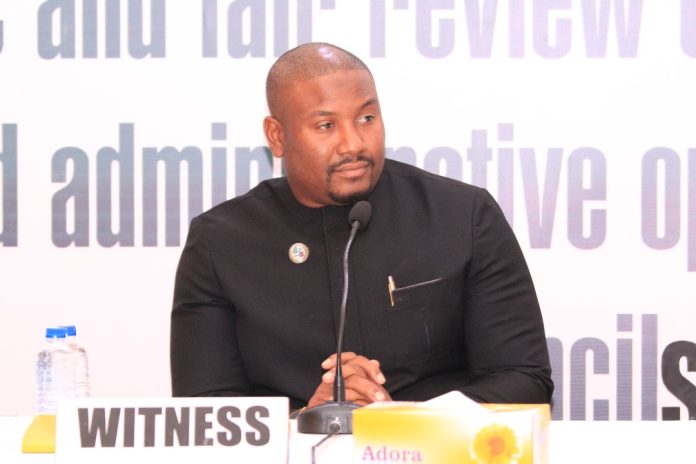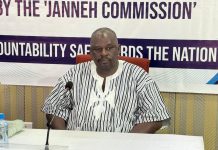By Yankuba Jallow
Talib Ahmed Bensouda, the Mayor of Kanifing Municipal Council (KMC), faced pointed questions last week before the Local Government Commission of Inquiry over millions in foreign grants received under his leadership. The session exposed sharp disagreements between the mayor and Lead Counsel Patrick Gomez over whether donor funds remain “EU money” or must legally be treated as council revenue.
Bensouda told the Commission that the council had received a series of grants during his tenure: £10,160 from the United Kingdom High Commissioner in The Gambia for a solar-powered cold storage facility at Serrekunda Market; £92,262.6 from the European Union for climate resilience through biodegradable waste management; and £3.145 million for the Kanifing Environmental Transformation Project (KETP). He said the KETP was designed in his office with the Tony Blair Institute, failed in 2019, but succeeded the following year.
He described the project’s steering committee as comprising himself, three KMC councilors representing women, youth, and the environment, two EU members, and a representative from Peterborough City in the United Kingdom who sits virtually. Staff, he said, were hired through the council’s Establishment and Appointment Committee, which he claimed had the expertise to manage the process. A Project Director was appointed to run the initiative, while KMC staff were co-opted to save money and build internal capacity.
Bensouda outlined the scope of KETP: an education component with a library featuring an innovation hub, local language section, children’s area, internet café and repair facilities; an environmental push to plant 190,000 trees across six parks, five of which are operational; procurement of 10,000 waste bins, four sanitation vehicles, and three administrative vehicles; and municipal radio facilities that remain online only, after government withheld a frequency license. The EU, he added, had sent auditors and compliance officers who rated the council “high.”
On financial controls, the mayor said: “The EU has all powers in terms of regulations.” He added: “Most of the time, they (the EU) write to the project office for compliance. The project office has to seek clearance for the European Union for all expenditures or all changes in the expenditures.” According to him, the council also required expenditures above D500,000 to be approved by council and subjected to GPPA regulations.
He explained that the EU disbursed funds directly to the KMC, with the CEO and Finance Director holding access before forwarding money to the project team. “If they need more funds, the project team would have to provide justifications before the CEO disburses the funds,” he said.
But Lead Counsel Gomez pressed him on whether such grants legally belong to the council. “When money is disbursed as a grant, it becomes council’s revenue,” Gomez said.
“Yes, I agree,” Bensouda replied.
“This is why the funds are sent to the KMC and the CEO and the Finance Director have access to it because it is council’s revenue,” Gomez continued. Bensouda countered: “The money is EU money.”
“It is not the EU’s money,” Gomez shot back. “It is council’s money. That is what the law says. It is not my word.”
“No, there are two types of grants. There are direct and indirect grants,” Bensouda argued, describing the EU’s support as a “hybrid” grant.
“What you are saying, this position, how do you back it up? Can you show us this from the law?” Gomez asked.
The witness conceded that the council is bound by regulations. He was handed a copy of the Local Government Finance and Audit Act and asked to read section 4, which defines council revenue. The provision listed grants, rates, royalties, licenses and other sources.
“It did not say indirect grant,” Gomez told the mayor.
“It says grants,” Bensouda replied.
At that point, Bensouda acknowledged that grants are indeed council revenue.
The session also heard that the KMC had received a D13 million dalasi grant for a GPS system intended to strengthen the municipality’s tax collection regime.
Bensouda was asked to bring documen̈ts relating to the grants KMC received.



















